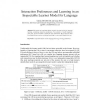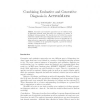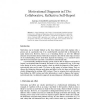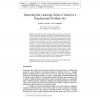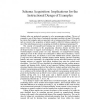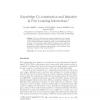AIED
2009
Springer
14 years 6 months ago
2009
Springer
We present an inspectable learner model to prompt noticing in language learning, considering interaction preferences. Four patterns of model inspection were seen, but most students...
AIED
2009
Springer
14 years 6 months ago
2009
Springer
Abstract. This paper presents a methodology for automatically customizing a scenario to suit a learner’s abilities, needs, or goals. Training scenarios are often utilized to give...
AIED
2009
Springer
14 years 6 months ago
2009
Springer
Generative and evaluative approaches are two different ways of diagnosing students’ input that have been realized in a number of intelligent tutoring systems. We describe how Ac...
AIED
2009
Springer
14 years 6 months ago
2009
Springer
A central challenge in the design of motivationally intelligent tutoring systems lies in defining and diagnosing a learner’s motivational state: in particular, in distinguishing ...
AIED
2009
Springer
14 years 6 months ago
2009
Springer
Traditional methods of dental surgical skills training and assessment are being challenged by complications such as unavailability of expert supervision and the subjective manner o...
AIED
2009
Springer
14 years 6 months ago
2009
Springer
This paper focuses on whether learners of basic music theory may find a multiple-media independent open learner model useful to explore their knowledge of harmony concepts. Learner...
AIED
2009
Springer
14 years 6 months ago
2009
Springer
Researchers that make tutoring systems would like to know which pieces of educational content are most effective at promoting learning among their students. Randomized controlled e...
AIED
2009
Springer
14 years 6 months ago
2009
Springer
AIED
2009
Springer
14 years 6 months ago
2009
Springer
The aim of the project we discuss in this paper is to develop a computational model of peer learning. We present an extensive analysis of peer learning dialogues, analysis on which...
AIED
2009
Springer
14 years 6 months ago
2009
Springer
We describe an automated method to assess the expressiveness of children’s oral reading by measuring how well its prosodic contours correlate in pitch, intensity, pauses, and wor...
